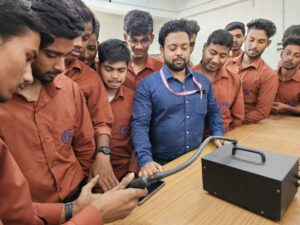ITI Courses
Courses on Offer
ITI (Industrial Training Institute) courses are vocational training programs aimed at providing students with industry-specific skills and practical knowledge to prepare them for various trades and technical roles. Here’s an overview of what ITI courses entail:
Overview
Duration: ITI courses typically range from six months to two years, depending on the trade and the specific program.
Structure: The courses are designed to be hands-on and practical, focusing on equipping students with the skills required for specific trades. The curriculum includes a mix of theoretical classes and practical training.
Trades: There are numerous trades available in ITI courses, categorized into Engineering and Non-Engineering trades. Some common trades include:
- Engineering Trades: Electrician, Fitter, Turner, Mechanic (Motor Vehicle), Draftsman (Mechanical/Civil), Tool & Die Maker, Welder, etc.
- Non-Engineering Trades: Stenography, Secretarial Practice, Dress Making, Hair & Skin Care, Data Entry Operator, etc.
Entry Requirements: The eligibility criteria for ITI courses vary by trade and duration. Generally, candidates must have completed 8th, 10th, or 12th grade, depending on the specific course requirements.
Objectives
- Skill Development: To impart practical skills and knowledge that meet the needs of various industries.
- Employment Readiness: To prepare students for immediate employment in skilled trades and technical roles.
- Entrepreneurial Skills: To equip students with the skills necessary to start their own businesses or work as independent contractors.
Career Opportunities
Graduates of ITI courses can pursue various career paths, including:
- Technical Roles: Technician, Machine Operator, Electrician, Welder, Mechanic, Plumber, etc.
- Apprenticeships: Many ITI graduates opt for apprenticeships in industries to gain further hands-on experience and improve their employability.
- Further Education: ITI graduates can also pursue higher education, such as diploma courses or specialized certifications, to enhance their skills and qualifications.
- Self-Employment: Many trades offered in ITI courses provide the skills necessary for starting one’s own business or working independently.
Institutions and Accreditation
ITI courses are offered by Industrial Training Institutes (ITIs) and Industrial Training Centers (ITCs) across India. These institutions are regulated by the Directorate General of Training (DGT) under the Ministry of Skill Development and Entrepreneurship. The courses are accredited by the National Council for Vocational Training (NCVT) or State Council for Vocational Training (SCVT).
Conclusion
ITI courses in India play a crucial role in the vocational education landscape by providing targeted training for various trades. These courses are designed to meet the specific needs of industries, making graduates highly employable in technical and skilled trades. They offer a valuable pathway for students seeking practical skills and immediate employment opportunities.





